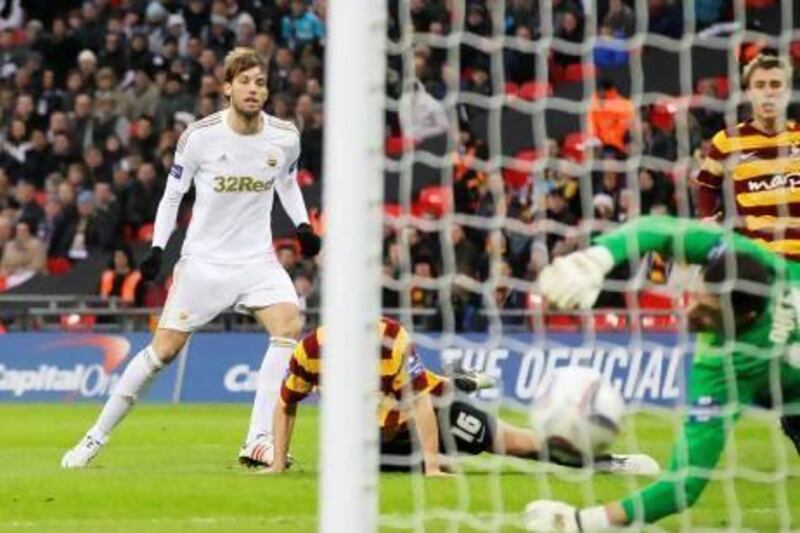LONDON // The lesser fairy tale prevailed. In almost any other year, for Swansea City, a club that almost slipped into bankruptcy in the fourth flight a decade ago, to win a trophy would be regarded as a great romantic story.
As it was, their comfortable win over Bradford City felt almost anticlimactic – not that Michael Laudrup or any of their 30,000 fans inside Wembley Stadium cared as, in their centenary year, they took a major trophy to Wales for the first time since 1927.
Bradford had beaten Wigan Athletic, Arsenal and Aston Vila on their way to becoming the first fourth-flight side in a final since 1962 but the energy and combativeness that had driven their unlikely progress was meaningless against Swansea's possession game.
They had unsettled Arsenal and Villa with set plays but only won two free-kicks in positions from which they could pressure. They did not win their first corner until the 86th minute.
"It's one thing to win a trophy with Barcelona, Madrid or Juventus but to win it with a small team like Swansea is amazing," said Laudrup, the manager.
"To have the trophy, to lift the trophy, is great, but the way we did it, to win 5-0 – that’s says a lot about our performance. We all know what Bradford have down this season so what they have done is outstanding."
There was a pleasingly old-fashioned feel about the whole day. In the modern world, in which a small handful of teams tends to dominate, some of the gloss has gone off Wembley finals, familiarity breeding if not contempt then at least a certain jadedness.
But Swansea had never played in a major Wembley final and Bradford had not been in one since 1911.
For both sets of supporters there was a sense of this being a day out to be savoured.
Wembley Way was heaving from several hours before kick-off, amass of white and claret-and-amber, fans happily mingling.
There was a queue to be snapped by the Underground roundel at Wembley Park station while policemen, in the absence of any sense of threat, seemed to send more time acting as photographers then doing anything in the way of traditional crowd control.
Once the seal had been set on Bradford’s defeat by the 58th-minute dismissal of their goalkeeper Matt Duke, the hero of so many of the earlier rounds, their fans responded by a mass waving of flags, defiant in the face of defeat, but also a celebration of one of the greatest giant-killing runs the League Cup has ever known.
However outclassed they were in the final, their achievement in getting there should not be forgotten – something Swansea recognised by forming a guard of honour for their opponents.
"I think this final will remain in history a small part because of us and a large part because of Bradford," Laudrup said.
The destination of the cup, though, had not really been in doubt from the moment Nathan Dyer squeezed in the first goal on the quarter hour after Duke had parried a shot from Michu following a break led by Wayne Routledge.
Michu, changing feet rapidly, added a second before half-time with a clever jabbed finish.
Dyer, playing a smart one-two with Routledge, side-footed the third three minutes after half-time and, if that had not finished the game, the red card shown to Duke as he tripped Dyer did.
Jonathan De Guzman, after a lengthy argument with Dyer over who was to take it, converted calmly. De Guzman added the fifth from Angel Rangel’s cross in injury time.
Dyer’s tantrum was a bizarre sour note, an example of self that was out of keeping with the Swansea way, and he was still complaining when he was substituted with 12 minutes remaining.
Laudrup’s disbelieving smile as he directed Dyer to the bench suggested what he thought of his behaviour, although he played the incident down after the game.
But it would be wrong to let that issue detract from Swansea’s achievement.
Perfunctory the victory may have been, but it came as reward for a decade of sensible and inspired management.





